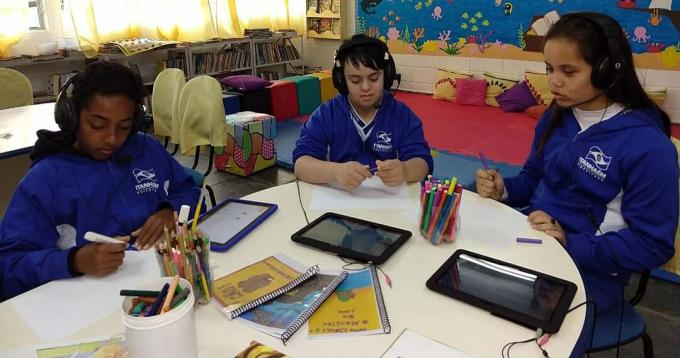Inclusive education. Educate all children in the same school context. See special children as diversity, not as a problem. Transformation process in which the participation of all students is made possible. Conceptualizing inclusive education is easy, but what about putting such definitions into practice?
The school community of a college in the city of Itanhaém, on the coast of São Paulo, managed to take this to heart by developing a project that creates audiobooks for students who cannot read. It all started from the observation of a student who, despite not understanding what was written, kept leafing through the stories written by his colleagues.
see more
IBGE opens 148 vacancies for Census Research Agent; see how…
Published law establishing the 'Program for the Acquisition of…
He didn't read, but looked at all the pictures with the utmost attention. The teenager is epileptic and has paralytic syndrome. In addition, he lost his father last year, victim of a massive heart attack. However, not all the challenges in the world could stop him and his efforts awakened an idea in colleagues and educators: turning lines into sounds.
Who started it all was Alessandra Aparecida Sales Cavalcante, coordinator of the Maria Aparecida Soares Amêndola school, located in one of the poorest regions of the city. “Why don't we produce an audiobook so he can also hear the stories”?. Students of good will and teachers with a musical background were the magical ingredients for the project.
An initiative that would not only serve the teenager mentioned here. The school has ten more cases of special students. Therefore, the audiobooks produced would include all colleagues with physical, auditory, mental, visual, Down syndrome and autistic disabilities. All with the use of classic books and a microphone.
“Why use ready-made materials if we have such good students”? That's what the advisor thought when starting the project. In the first recordings, they used classics like The Three Little Pigs, The Princess and the Pea, Beauty and the Beast… modus operandi follows the same: each one records a story, with the lines captured by the microphone for later edition.

And every good story needs special effects, right? Therefore, the work is only completed with the addition of sound design. That raindrop falling, the door slamming, the sound of shoes on the floor. It's details that make all the difference in the imagination of those who listen!
During the recordings, only one student and the teacher enter the room, no friends around.
At first, it wasn't easy. Students had to overcome nervousness and reading addictions so that everything went as planned. All errors, however, were corrected over time. And do you know what's new?
In addition to the spoken stories, the audiobook project gained a new form of inclusion: the Brazilian Sign Language (Libras). One of the students, whose parents and brother are hearing impaired, managed to record a video translating one of the stories to facilitate understanding and communication.
We already mentioned that the school is located in one of the poorest neighborhoods in Itanhaém, on the coast of São Paulo, right? But, the challenges do not stop there. In addition to the reality of deprivation in which many do not even know a shopping center, some of the children face serious family problems at home.
And, if the daily fights were not enough, the college was invaded at the beginning of the year, suffering robberies and depredations in its structure. The entire school community, including teachers and parents, got involved in rebuilding the site, using their own financial resources. “They say we are a phoenix, we are constantly being reborn”, comments the coordinator, Alessandra.

Like good Brazilians, they never give up! The audiobook project is going so well that, since May, there have been 20 recordings for three schools in the municipal education network. The goal is that, by the end of the year, at least 60 titles have already been recorded in order to make the collection available in the city's municipal library.
Sandra Regina, director of the school, says that all the work is done in a very natural way, “for this reason, we believe that people have been touched”. And do you know what the biggest reward is? Listening to colleagues like those who inspired the project saying that “now they can read a book”.
